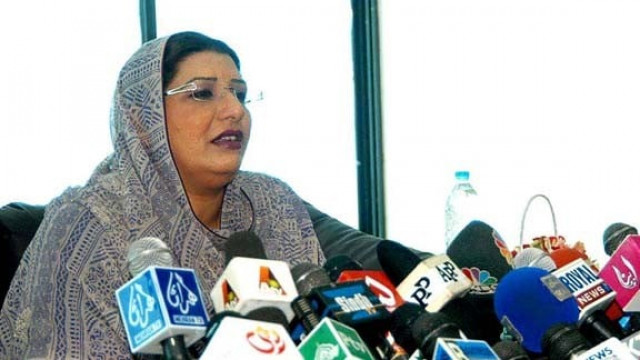Carving your name: In the world of male journalists
Awan urges female journalists to prove their mettle by cashing in on opportunities.

In the male-dominated world of journalism, women have to struggle hard to carve a place for themselves and earn recognition. However, there are abundant opportunities out there for the females to showcase their talents.
This was said by Firdous Ashiq Awan, Minister for Information and Broadcasting, while addressing the inaugural session of a two-day conference titled “Gender Discrimination and Capacity Building” at National Press Club on Saturday.
Renowned journalists from all media outlets, female journalists from across the country, women rights’ activists and media students were present on the occasion.
The conference aims to provide a platform to female journalist where they could share the problems they face in journalism and to provide them with “practical solutions”.
Awan said, “Where there are problems and difficulties for female journalists in this profession, there are also ample opportunities for them to showcase their strength and courage.”
Awan was of the view that all working women in Pakistan face sexual harassment but it up to them how they dealt with it.
“Throughout my professional life I have faced various forms of harassment. But I never took it lightly and always made those people pay for it,” she said.
Earlier while speaking on the occasion Anis Haroon, Chairperson National Commission on the Status of Women (NCSW), said women started fighting for their rights in 1969 and were accepted into journalism in Pakistan in 1970. However, due to lack of professional training female journalists were left behind by their male counterparts.
“In every field her (woman’s) capacity is being challenged,” she said.
Haroon added that in majority of the media outlets females were not being given high posts. “To empower female journalists there is a dire need to give them equal recognition and representation,” she said.
Mazhar Abbas, a senior journalist, said those hiring female journalists in Pakistan tend to look at “glamour” more than the person’s capabilities. He pressed for a minimum 20 per cent representation for female journalists in the union.
While sharing her experience, one of the participants narrated how she was sexually harassed by a famous journalist. Later, she was fired and had a hard time looking for a job elsewhere. “People thought that since I was fired from one place, I was incapable of doing a good job. No one was ready to listen and believe what really had happened to me,” she said.
Another female journalist told the participants that there were no separate washrooms for women in her office. So she had to go out, hire a taxi and go to a nearby bus stand, where this facility is available.
Saleem Shahid, President Quetta Press Club, said that while in his region women do study mass communication, they are reluctant to join journalism.
To make the conference and its theme more meaningful a stage performance was held to showcase how a female journalist faces harassment in the office and in the field, and how such circumstances force her to quit her job.
The participants were hopeful that the conference will come up with recommendations to address their key issues that include workplace harassment, pay packages, separate washrooms, timings and transport problems.
Published in The Express Tribune, April 17th, 2011.



















COMMENTS
Comments are moderated and generally will be posted if they are on-topic and not abusive.
For more information, please see our Comments FAQ